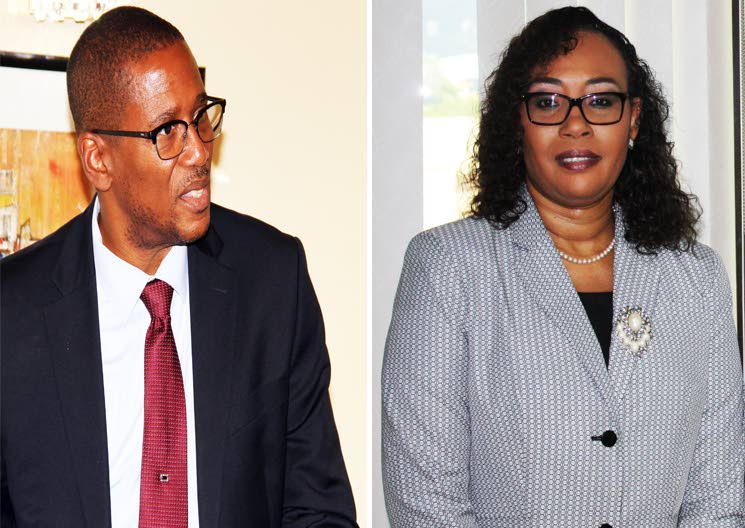Ex-chief magistrate tells Appeal Court – Judge wrong to discard 'forced resignation' claim

WAS the High Court judge who dismissed former chief magistrate Marcia Ayers-Caesar’s legal challenge of her short-lived judicial appointment in 2017, wrong to do so? She is of the opinion that he was.
On October 8, Justice David Harris dismissed Ayers-Caesar’s judicial review claim, in which she alleged Chief Justice Ivor Archie and the Judicial and Legal Service Commission (JLSC) pressured her to resign as a judge.
She claims this happened after it was disclosed she had left 52 preliminary inquiries in the magistrates court unfinished when she took up an appointment as a judge.
Ayers-Caesar was appointed a judge on April 12, 2017, but resigned 15 days later.
Harris held that she was treated fairly by the Chief Justice, the JLSC – of which he is chairman – and former president Anthony Carmona.
Ayers-Caesar appealed Harris’s decisions except those that concerned Carmona.
On Tuesday, the Appeal Court’s most senior judges, Allan Mendonca – currently acting as Chief Justice; Justice Alice Yorke-Soo Hon, and Nolan Bereaux – heard submissions from both Ayers-Caesar and the JLSC.
They have reserved their decision on the appeal.
Leading the team for the former chief magistrate is former attorney general Ramesh Lawrence Maharaj, SC, while the JLSC’s team is led by another former AG, Russell Martineau, SC.
In his opening address, Maharaj said Harris made grave errors in the law and facts in his approach and findings.
He said the judge should have held there was undue pressure on Ayers-Caesar to resign and to find that the JLSC was vicariously liable because of what the Chief Justice had told her.
IMPORTANT
LEGAL ISSUES
Maharaj said the appeal raised important issues of constitutional and public law principles, particularly as it relates to the independence of the Judiciary and the constitutional guarantee of security of tenure of judges of the Supreme Court.
He maintained a judge cannot be suspended or have their appointment terminated outside of a section 137 process. Maharaj maintained Harris failed to do the fact-finding exercise all judges are required to do when coming to a decision on disputed facts.
He went through much of the evidence advanced at the trial before Harris to support his arguments.
He said undue pressure was put on the former chief magistrate to tender her resignation.
“Our submission is that his findings cannot stand,” he said. He said the fact that she had unfinished cases was not grounds for her removal.
He told the judges even if they found that Archie did not threaten her, they should still find that the JLSC did put unfair pressure on her. Ayers-Caesar had alleged she was threatened that if she did not agree to resign as a judge, the JLSC would recommend to Carmona to revoke her judicial appointment.
JLSC NOT INVOLVED
In his submissions, Martineau denied the JLSC had anything to do with Ayers-Caesar’s decision to tender her resignation even when it came to light after a group of prisoners rioted at the Port of Spain magistrates’ court as their cases were some of those she left unfinished when she took up the judgeship.
Martineau said Archie was dealing with administrative issues as chief justice.
He was operating as Chief Justice and the commission did nothing at all.”
Martineau also said in their administrative capacities, chief justices were entitled to speak with their judges on matters that could border potential misbehaviour.
“You can’t have a chief justice who is not concerned about the administration of justice. This was a matter of great interest to the public and administration of justice and he had a direct interest as chief justice. He is entitled to have a frank talk with his two judges. This was not a situation for the JLSC.”
He was pressed by the judges to say why the entire process - the JLSC meeting to discuss what to do; the recommendation to Ayers-Caesar to resign and return to the magistracy or have her appointment revoked; and her needed to tender her resignation to the president - was done in one day,
Martineau said the issue needed urgent action because of what happened with the prisoners at the magistrates’ court.
He said Ayers-Caesar could have asked for time to think about her next move and maintained that Archie did not propose to the commission a solution to the situation.
Martineau said it was improbable and impossible to suggest the JLSC pressured her to tender her resignation. He reminded the judges the appeal was against the JLSC, and asked, “What is the decision of the JLSC is she challenging and wants to be quashed? Their case should be rejected on what she said the chief justice said.”
He maintained no pressure was put on her by the JLSC.
However, in response, Maharaj said it did not matter what the words of the chief justice were. He said the Appeal Court had to determine if whatever was said to her amounted to legitimate pressure for her resignation and what her belief was at the time.
He also said the JLSC delegated the task to Archie to pass on to the former chief magistrate its decision that she resign or they would be forced to go to the president. He has asked the Appeal Court to reverse the judge's decision and grant Ayers-Caesar the declarations she has sought.
Also appearing with Maharaj for the former chief magistrate were attorneys Ronnie Bissessar and Vijaya Maharaj while also appearing with Martineau for the JLSC were Deborah Peake, SC, Ian Benjamin,SC, and Ian Roach.
The Attorney General’s team were: Douglas Mendes,SC, Ravi Nanga, Ravi Heffes-Doon and Savitri Maharaj
.

Comments
"Ex-chief magistrate tells Appeal Court – Judge wrong to discard ‘forced resignation’ claim"